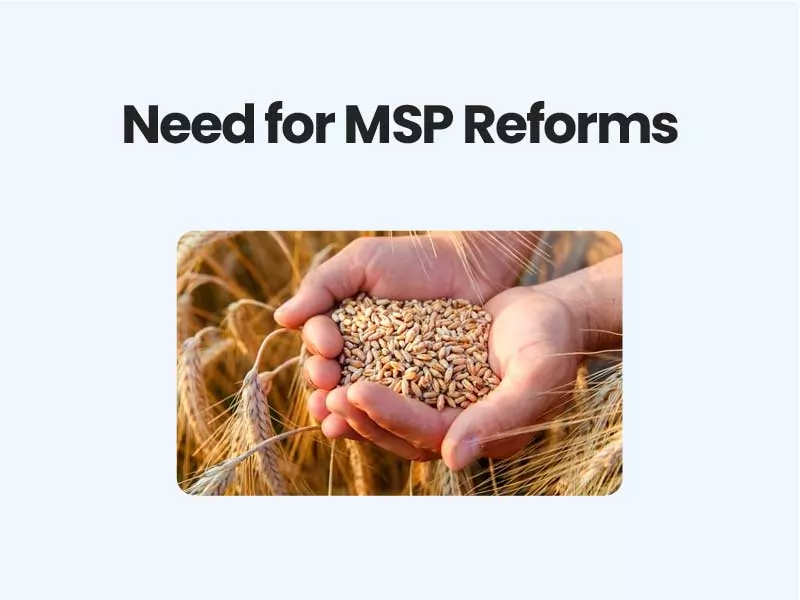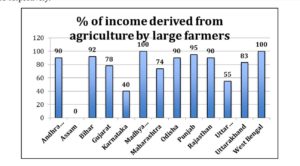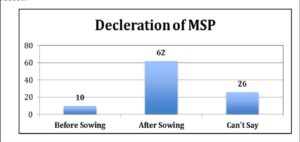Companion@360 → 7 Month programme to sharpen your writing skills → REGISTER NOW

Need for MSP Reforms
Based on the recommendations of the Commission for Agricultural Costs and Prices, the Department of Agriculture and Co-operation, Government of India, declares Minimum Support Prices (MSP) for 22 crops before their sowing seasons.
The idea behind MSP is to give a guaranteed prices and assured market to the farmers and protect them from price fluctuations and market imperfections.
The guaranteed price and assured market are expected to encourage higher investment and in the adoption of modern farming practices.
Evaluation Objectives
- To explore and analyze the effectiveness of price policy in India in the context of nationwide price support objectives set forth by the government.
- Impact of MSP on creating a predictable and equitable crop price regime.
- To identify regional and intercrop variations in the implementation of MSP and reasons for the same. d. To study and evaluate the impact of MSP on cropping patterns
- To evaluate the impact of MSP on long-term agricultural competitiveness.
- To evaluate the impact of MSP on optimal land and water use and sustainability on a nationwide basis across crops.
- To evaluate whether adoption of improved technology, appropriate investment and rural infrastructure has been aided by operation of MSP.
- To suggest policy measures related to MSP for the future.
Significance:
- The government has increased the MSP of Kharif crops for marketing season 2020-21, to ensure remunerative prices to the growers for their produce.
- The highest increase in MSP is proposed for nigerseed (Rs 755 per quintal) followed by sesamum (Rs 370 per quintal), urad (Rs 300 per quintal) and cotton (long staple) (Rs 275 per quintal).
- The differential remuneration is aimed at encouraging crop diversification.
- The government’s strategy is one of promoting sustainable agriculture with diversified cropping pattern matching with the country’s agro-climatic conditions, towards higher productivity without jeopardizing the nation’s bio-diversity.
- Support is in the form of MSP as well as procurement. Besides, with the intention of giving enough policy thrust to income security of the farmers.
- The government’s production-centric approach has been replaced by an income-centric approach.
- The government is taking holistic approach towards supporting the farmers and facilitate farming-related activities in the lockdown situation due to Covid 19.
- Efforts are being made to facilitate the marketing of agricultural produce by the farmers
Challenges:
- Awareness of Farmers about MSP
- Medium of Awareness about MSP
- Production, Consumption and Sale of Major Crops
- Mode of Payments Received by the Farmers
- Delays in Receiving MSP Payments
- Mediums adopted by farmers to sell their Produces
Government initiatives:
- Pradhan Mantri Annadata Aay Sanraks Han Abhiyan”
- Price Support Scheme (PSS)
- Price Deficiency Payment Scheme (PDPS)
- Private Procurement & Stockist Scheme (PPSS) on a pilot basis.
- Pradhan Mantri Kisan Samman Nidhi (PM-KISAN)
- Pradhan Mantri Garib Kalyan Yojana (PM-GKY).
Read Also Fasal Rahat Yojana
Way forward:
The Minimum Support Price is an important policy of the Union Government to determine floor price of major agricultural produces every year for protecting the farmers from the middlemen and fluctuating market conditions as it provides them an assured market in addition to a minimum assured return.
- First and foremost the awareness among the farmers needs to be increased and the information disseminated at the lowest level so that the knowledge would increase the bargaining power of the farmers.
- More godowns should be set up and maintained properly for better storage and reduction of wastage.
- The small and marginal farmers can be provided with some exemption in FAQ norms to provide them with a source of income.
- The Procurement Centres should be in the village itself to avoid transportation costs.
- The farmers should receive their MSP rate in case on the spot and in the same day, so that they will be encouraged to improve their production and create more marketable surplus.


